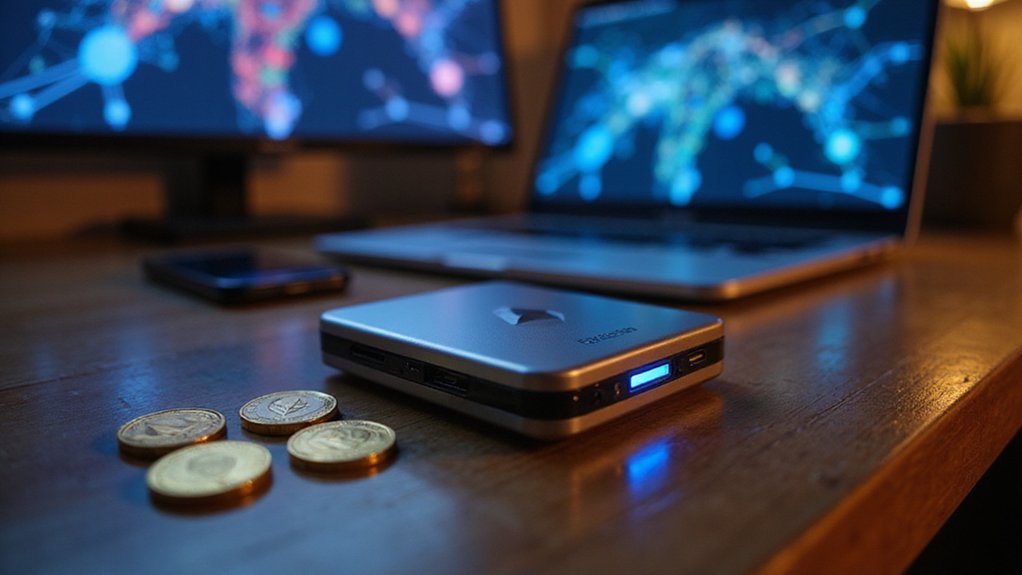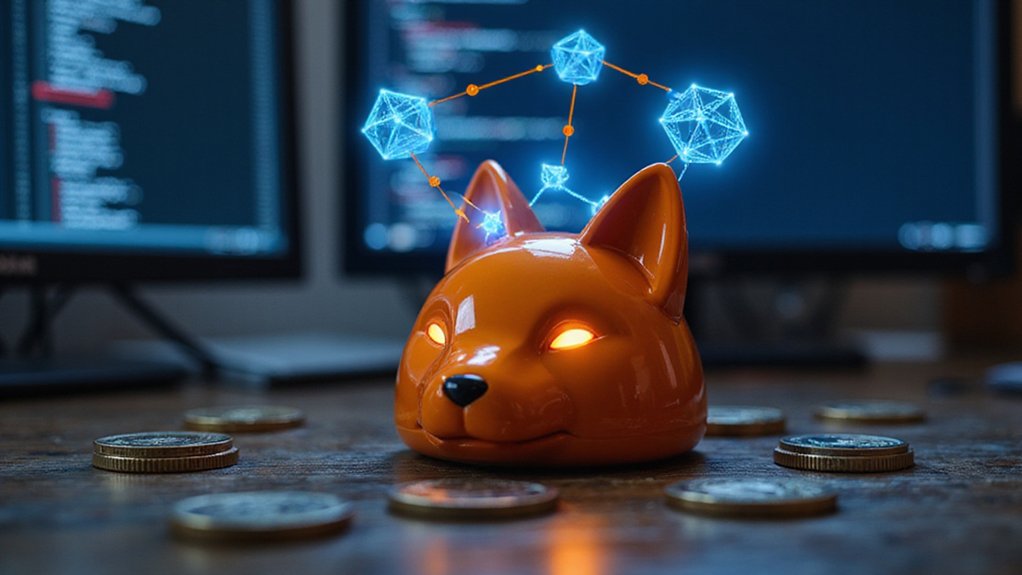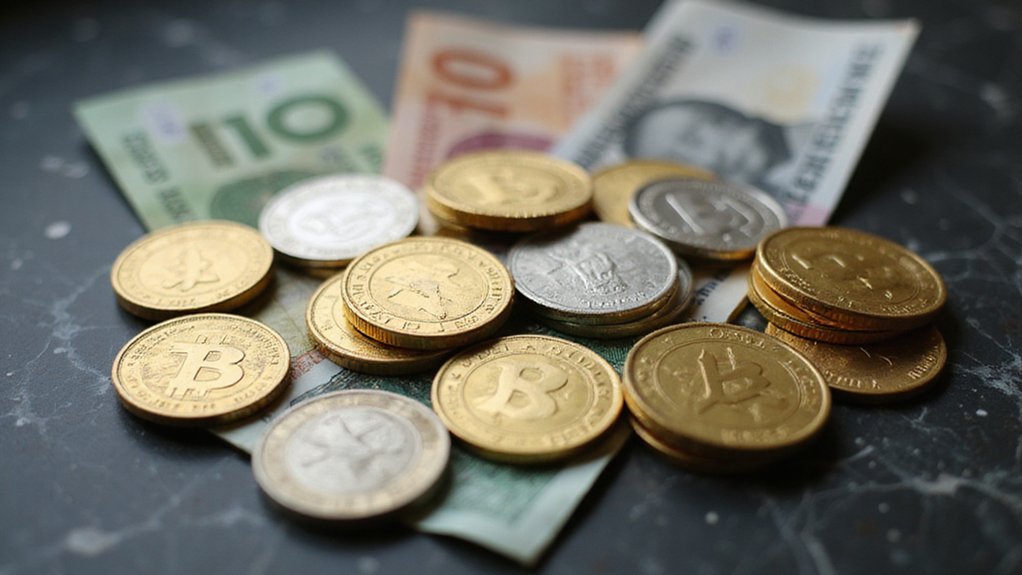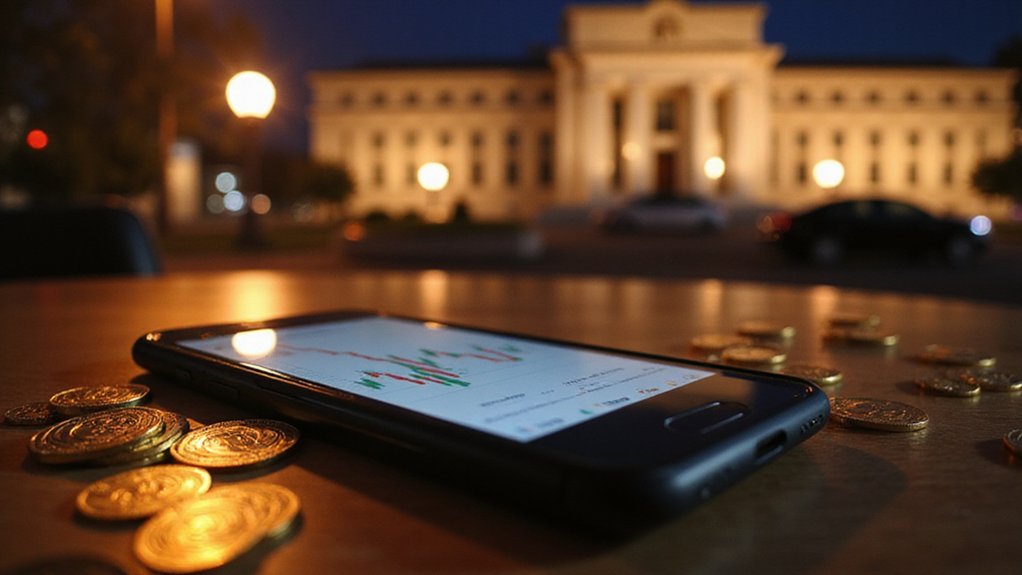MetaMask operates as a browser extension that transforms ordinary web browsers into cryptocurrency wallets, storing private keys locally while connecting users to decentralized applications across Ethereum and other blockchain networks. The wallet generates an essential 12 or 24-word seed phrase for recovery, manages multiple accounts from a single installation, and facilitates transactions through cryptographic signatures—all without requiring users to maintain full blockchain nodes (though they’ll still pay those delightful gas fees). Understanding its deeper mechanics reveals why millions trust this non-custodial gateway.

Among the constellation of cryptocurrency wallets that have emerged to serve the decentralized finance ecosystem, MetaMask stands as perhaps the most ubiquitous gateway between traditional web browsers and the Byzantine world of blockchain transactions.
The wallet’s foundation rests upon the venerable principle of seed phrase generation—those 12 or 24 words that ostensibly provide recovery capabilities while somehow managing to be simultaneously essential and easily misplaced. From this linguistic foundation, MetaMask derives the cryptographic key pairs that form the backbone of its security architecture: private keys stored locally (maintaining the cherished ideal of non-custodial control) and public keys displayed for transaction purposes. These collaborate through ECDSG protocols to create digital signatures, transforming mere intentions into immutable blockchain commands.
Those essential dozen words that simultaneously secure your digital fortune and guarantee sleepless nights when inevitably misplaced.
MetaMask’s account management capabilities extend beyond simple storage, enabling users to generate multiple accounts from a single seed phrase while maintaining secure isolation between each account’s private key. The wallet accommodates various Ethereum-compatible tokens, including ERC-20 and ERC-721 standards, with particular attention to NFT management—because apparently viewing digital art requires the same security protocols as managing treasury bonds. Like other self-custody solutions, MetaMask ensures users maintain complete control over their private keys and cryptocurrency holdings without relying on third-party custodians.
The wallet’s true utility emerges through its role as a bridge to decentralized applications. Upon detecting MetaMask, DApps can access wallet functionality through the web3.js library, facilitating everything from asset trading to smart contract execution. This connection spans multiple blockchain networks, including Ethereum and BNB Smart Chain, expanding the universe of accessible applications. MetaMask’s EVM-compatible chains support demonstrates its commitment to multi-ecosystem accessibility, allowing users to interact with various blockchain networks through a unified interface. The wallet’s extensibility reaches new heights through JavaScript programs that execute in secure, isolated environments to enhance functionality beyond core wallet capabilities.
Transaction processing relies on MetaMask’s ability to handle cryptographic operations locally while leveraging Infura nodes for blockchain interaction—a design that eliminates the need for users to maintain full nodes while retaining thorough blockchain access. The wallet manages gas payments and transaction fees with algorithmic precision, though users often discover that “seamless” transactions come with costs that would make traditional banks blush.
Perhaps most remarkably, MetaMask integrates decentralized exchange aggregators for token swaps, enabling peer-to-peer trading without intermediaries. Available across browser extensions and mobile applications, it transforms complex blockchain interactions into deceptively simple interface clicks—assuming one can navigate the occasionally labyrinthine world of transaction confirmations and network congestion.
Frequently Asked Questions
Is Metamask Wallet Free to Use?
MetaMask operates as a genuinely free wallet application—no subscription fees, maintenance charges, or account creation costs burden users.
However, blockchain transactions still require gas fees paid to network validators, not MetaMask itself. The wallet cleverly leverages Infura’s free tier (3,000,000 daily credits) for blockchain data access.
While third-party services integrated within MetaMask may impose spreads or fees, the core wallet functionality remains invigoratingly cost-free for self-custodial storage.
Can I Use Metamask on Mobile Devices?
MetaMask operates seamlessly across mobile platforms through dedicated iOS and Android applications, offering the same non-custodial functionality as its desktop counterpart.
The mobile interface provides integrated Web3 browsing, granular dapp connection controls, and enhanced privacy management—allowing users to selectively connect individual accounts rather than exposing their entire wallet ecosystem.
Recent updates improved load times and navigation, making mobile DeFi interactions surprisingly fluid for pocket-sized crypto management.
What Cryptocurrencies Does Metamask Support?
MetaMask supports Ethereum’s native ETH alongside all ERC-20, ERC-721, and ERC-1155 tokens—from USDC to those obscure DeFi gems cluttering portfolios.
The wallet accommodates Polygon’s MATIC and recently added Solana support, with Bitcoin integration planned for the future.
Users can manually import unlisted tokens (because apparently algorithmic detection remains imperfect) while leveraging built-in swaps across thousands of supported assets through integrated exchange providers.
How Do I Recover My Metamask Wallet if I Lose Access?
MetaMask wallet recovery hinges entirely on the 12-word Secret Recovery Phrase (SRP)—that seemingly innocuous string of words users presumably saved during initial setup.
One simply reinstalls MetaMask, selects “Import existing wallet,” enters the phrase precisely (lowercase, proper sequence), and sets a new password.
Without this SRP, however, recovery becomes impossible; MetaMask stores nothing centrally, leaving users to contemplate their backup diligence while staring at permanently inaccessible funds.
Is Metamask Safe From Hackers and Security Breaches?
MetaMask employs robust security measures—private keys encrypted locally, never leaving users’ devices, plus regular vulnerability patches and community-driven bug bounty programs.
The recently introduced Security Alerts (developed with Blockaid) proactively warn against malicious dApps and fraudulent transactions.
However, no system remains completely impervious; users still face risks from phishing attacks, compromised seed phrases, and their own operational security lapses—making MetaMask reasonably secure, though not foolproof.









